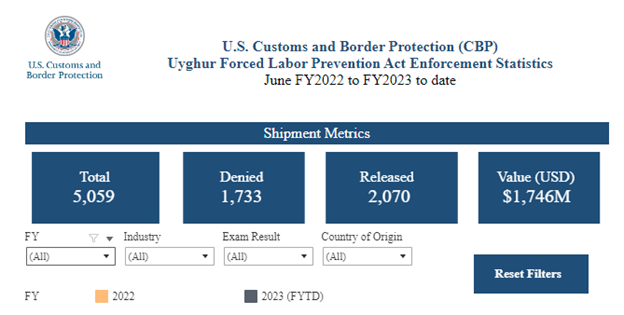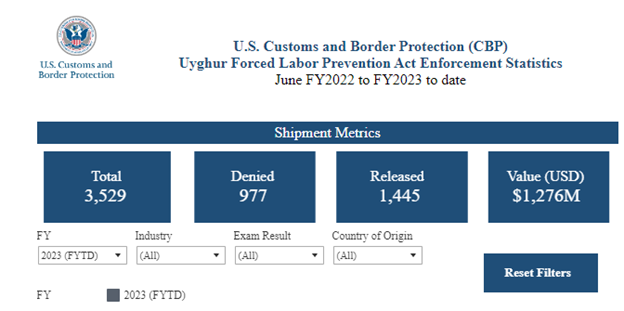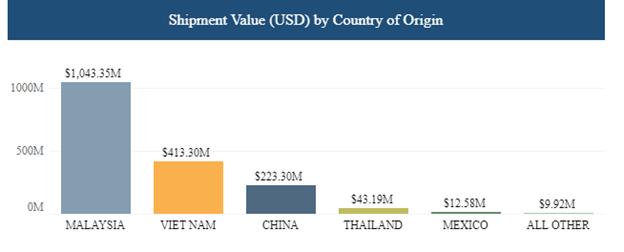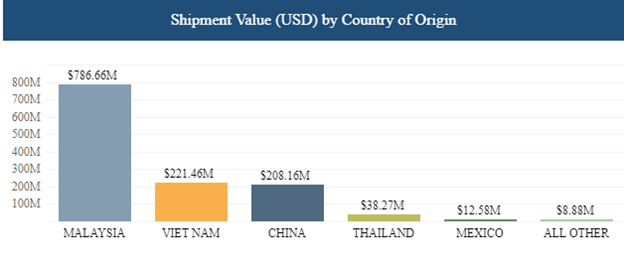The Uyghur Forced Labor Prevention Act (UFLPA) entered into the U.S. statute books in December 2021 with the aim of stepping up efforts to eradicate forced labor from supply chains.
The law allows Customs and Border Protection (CPB) and other task forces to ‘presume’ that forced labor was used in any imports involving materials from Xinjiang, China, along with other listed entities.
The law went into effect in June of the following year and has since resulted in $1.7 billion worth of goods entering the United States to be detained for inspection, with about a fifth of that denied altogether.
Businesses, faced with this added level of accountability, need to check to make sure that forced labor is not part of their manufacturing process. And they have to prove it when asked to produce documentary evidence.
Key Takeaways
- The U.S. bans imports suspected of being produced by forced labor at any point in the mining or manufacturing process.
- Uyghur Forced Labor Prevention Act (UFLPA) is built on the Tariff Act of 1930, which denies imports that involve forced labor.
- Since the UFLPA was enacted, approximately $1.7 billion in shipments have been detained for inspection.
- FLETF and CPB actively screen imports against its UFLPA entity list, and imports are detained if they suspect the involvement of forced labor and denied parties.
- Businesses are required to proactively prove UFLPA compliance.
The CPB and the Forced Labor Enforcement Task Force (FLETF) evaluate all imports and detains them if they suspect that the goods are made wholly or in part in the Xinjiang region of the People’s Republic of China or if at any point in the supply chain they interacted with entities on their denied party lists. Importers can challenge the detainment, but if the challenge fails due to lack of sufficient proof of UFLPA compliance or if the rebuttal is not done promptly, the shipment will be denied.
What is Forced Labor?
What exactly is forced labor as defined by the U.S. government? The DHS defines forced labor as “when individuals are compelled against their will to provide work or service through the use of force, fraud, or coercion.”
Forced labor sometimes takes the form of physical isolation, such as self-contained camps. However, forced labor can also be less conspicuous in the form of compounding debt repaid through working, but where it’s never possible to pay off the debt in full.
For the purposes of the UFLPA, the focus is on the clear and direct forced labor occurring in China’s Xinjiang region.

The UFLPA Legislation: A Brief Overview
When the law went into effect in June 2022, CBP was given the authority to presume any goods with ties to Xinjiang had some element of forced labor involved in the mining or manufacturing process. CBP and FLETF can now detain imports based on this presumption.
The U.S. Department of State says the goal of UFLPA is to “help make global supply chains free from the use of forced labor.” UFLPA expands upon the 1930 Tariff Act, which also strived to deny imports suspected of being made with forced labor.
What is the Forced Labor Enforcement Task Force?
The DHS created FLETF with interagency partners work to monitor and enforce the prohibition on any imported goods made entirely or partially with forced labor. FLETF predates UFLPA and was established on May 15, 2020. The passing of UFLPA allowed the task force to deny imports based on its roles and expanded with the new legislation.
Current State of UFLPA Enforcement Actions
How has the UFLPA affected imports since it was enacted? The overall statistics about enforcement actions are:
- Total shipment value of $1.74 billion detained.
- 5,059 shipments detained.
- 2,070 shipments released.
- 1,733 shipments denied entirely (with a value of $385 million).
Below (Figures 1 through 4), a further breakdown of these statistics indicates how enforcement actions steadily increase over time and that most cases do not involve China directly. It’s crucial, therefore, for any importer to be acutely aware of its responsibilities to avoid potential issues.

Figure 1: A breakdown of detained imports between June 2022 and July 2023
Source: U.S. Customs and Border Protection

Figure 2: A breakdown of detained imports between January – July 2023
Source: U.S. Customs and Border Protection

Figure 3: Shipment value by country of origin, all-time
Source: U.S. Customs and Border Protection

Figure 4: Shipment value by country of origin, fiscal year-to-date
Source: U.S. Customs and Border Protection
UFLPA Compliance: Your Risks and Responsibilities
Many businesses are left asking, “How do I comply with UFLPA?” Let’s break down your risks, responsibilities, and how to prevent having any imports detained or denied. You can also get a copy of our handy miniguide which provides practical steps on how to fight forced labor in supply chains.
Know Your Responsibilities
UFLPA doesn’t impose compliance requirements on domestic companies directly. The FLETF will screen any import for any connection to known entities with ties to Xinjiang and forced labor as part of ongoing UFLPA compliance operations.
The DHS provides clear guidance for any business importing goods, the main points of which are:
- Due diligence, effective supply-chain tracing, and supply-chain management measures to ensure that such importers do not import any goods produced wholly or in part with forced labor from the PRC, especially from Xinjiang.
- The type, nature, and extent of evidence that demonstrates that goods originating in the PRC were not produced wholly or in part in Xinjiang.
- The type, nature, and extent of evidence that demonstrates that goods originating in the PRC, including goods detained, excluded, or seized for violations of the UFLPA, were not produced wholly or in part with forced labor.
Be Aware of the Risks
What are the risks of inadvertently transacting with a supplier on the UFLPA Entity List or otherwise having ties to denied entities? The short answer is that your imports may be detained or denied, and either situation inhibits your ability to operate. You can avoid this risk by conducting denied party screening against the UFLPA Entity List to avoid issues with your import.
Screen Partners and Suppliers
In the interest of UFLPA compliance, it is crucial to screen partners, suppliers, as well as the suppliers to your vendors against the UFLPA Entity List. Depending on your industry, this can be a significant task, but it needs to be handled quickly and accurately to prevent future problems.
Fortunately, new tools are now available that simplify the entire process, saving your compliance teams from manual processes that are time-intensive and error-prone in nature.
Adopt the Right Technology to Mitigate Risks
Your organization can mitigate the risk of having a shipment detained or denied by leveraging purpose-built technologies, enabling you to keep your supply chain operating smoothly and efficiently.
Automated tools allow you to scan your entire supply chain for denied entities to build a resilient supply chain. With these tools, you can mitigate risks by thoroughly tracing supply chain relationships, and screening against denied parties and sanctioned ownership lists.

Leverage Descartes to Effectively Remove Forced Labor from Your Supply Chain
Manually screening your partners and suppliers is time-intensive and error-prone, making it well worth the effort to invest in the right tools to handle the vital process automatically.
Descartes offers a range of solutions that can help you screen against UFLPA entity list, as well as get greater transparency of 3rd party risk and visibility into your supply chain.
Are you ready to screen all your partners and the entire supply chain to keep your operation running smoothly? Schedule a demo today to discover how Descartes can help.


